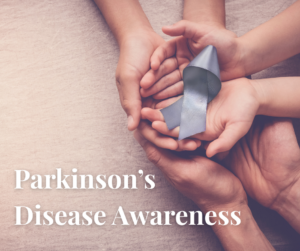Parkinson’s Awareness Month: Understanding the Impact on Older Adults and Their Families
April 2, 2025
April is Parkinson’s Awareness Month, a time to educate, advocate, and support those affected by Parkinson’s disease. With nearly one million Americans living with Parkinson’s and approximately 60,000 new cases diagnosed each year, awareness and understanding of this neurodegenerative disorder are crucial. Parkinson’s primarily affects older adults, with the average age of onset around 60, though younger people can also develop the disease. It is a progressive condition, meaning symptoms worsen over time, creating unique challenges for individuals and their families.
What is Parkinson’s Disease?
Parkinson’s disease is a disorder of the nervous system that primarily affects movement. It occurs when dopamine-producing cells in the brain start to decline, leading to symptoms such as tremors, muscle stiffness, and difficulty with balance and coordination. As the disease progresses, non-motor symptoms, including cognitive decline, depression, and speech difficulties, can also emerge. Though there is no cure, treatments such as medication, physical therapy, and in some cases, surgical interventions can help manage symptoms and improve quality of life.
The Impact on Older Adults
For older adults, Parkinson’s disease can significantly impact daily life. Simple tasks such as dressing, eating, and walking can become challenging, requiring adjustments to routines and environments. The disease affects individuals differently; some may experience mild symptoms for years, while others may face rapid progression and increased disability.
As mobility declines, the risk of falls increases, leading to potential injuries and hospitalizations. Muscle stiffness and balance issues make navigating home spaces more difficult, often requiring modifications like handrails, ramps, or assistive devices. Additionally, fatigue and muscle weakness can make it harder for individuals to maintain independence, leading to increased reliance on caregivers or family members.
Cognitive changes, including memory loss and difficulty with decision-making, can further complicate life for older adults. Depression and anxiety are also common among those with Parkinson’s, exacerbating the emotional burden of the disease. Ensuring mental well-being is just as important as managing physical symptoms, highlighting the need for comprehensive care and support.
The Emotional and Physical Toll on Families
Caring for a loved one with Parkinson’s can be both rewarding and overwhelming. Family members often step into the role of caregivers, assisting with daily activities, medication management, and emotional support. While this caregiving role can strengthen family bonds, it also comes with challenges.
The physical demands of caregiving can be exhausting, especially as the disease progresses and the individual requires more hands-on assistance. Lifting, repositioning, and helping with mobility can take a toll on caregivers, potentially leading to their own health issues. Additionally, the unpredictability of Parkinson’s symptoms can make long-term planning difficult, increasing stress and uncertainty.
Emotionally, watching a loved one’s health decline can be distressing. Many caregivers experience feelings of helplessness, frustration, and grief. The progressive nature of Parkinson’s means that adjustments are constantly needed, which can be emotionally draining. Without proper support, caregivers risk burnout, which can affect their own health and well-being.
The Importance of Support and Resources
Given the challenges Parkinson’s presents, support and resources are essential for both individuals and their families. Education about the disease can help families understand what to expect and how to manage symptoms effectively. Many organizations, such as the Parkinson’s Foundation and the Michael J. Fox Foundation, offer resources, support groups, and research updates.
Support groups can provide emotional relief by connecting individuals with others who share similar experiences. These groups offer a space to share challenges, exchange caregiving tips, and find encouragement. In-person and virtual support options are widely available, making it easier to access guidance regardless of location.
Professional caregiving services can also play a crucial role in easing the burden on families. Home health aides, physical therapists, and respite care providers can assist with daily tasks and medical needs, allowing family caregivers to take necessary breaks. Assisted living communities that specialize in Parkinson’s care can offer additional support, ensuring a safe and structured environment for those with advanced symptoms.
Moving Forward with Grace
Navigating life with Parkinson’s requires a strong support system, reliable resources, and compassionate care. At Grace Management, Inc., we understand the complexities of Parkinson’s disease and the challenges it brings to families. Our communities are designed to provide the necessary support, offering personalized care, safe living environments, and opportunities for social engagement. As we observe Parkinson’s Awareness Month, we remain committed to helping older adults live with dignity, independence, and the best quality of life possible. Whether you are seeking information, resources, or specialized care, we are here to support you every step of the way.

